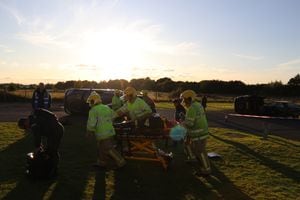Coronavirus: Shropshire fire service offers mental health support to emergency workers
Emergency service staff from across the county can now access mental health support through specialised practitioners at Shropshire's fire service.

The service has almost 30 trained Trauma Risk Incident Management (TRIM) practitioners that are available to support frontline staff such as NHS or care home workers and mental health teams who may be going through distressing events as a result of the COVID-19 pandemic.
Chief Fire Officer Rod Hammerton said: “People in emergency services or working on the front line regularly experience traumatic events and we have found TRIM is an effective way to provide ongoing mental support.
“The COVID-19 pandemic will expose people to new situations that may cause very real stress. As the situation deteriorates, it is best to be prepared and TRIM is a way of keeping a ‘watchful eye’ on staff who are struggling and ensuring they get help as and when then need it.
“TRIM addresses feelings of stress shortly after they occur and aims to prevent symptoms worsening. As everyone reacts in different ways to stress, our practitioners are trained to spot signs in people that may go unnoticed and help bring in early interventions.”
Research has shown that TRIM may assist in increasing mental resilience through support from colleagues and with more than 180 people taking advantage of the scheme over the past 18 months at the fire service, it has been heralded a huge success.
TRIM is wholly compliant with the PTSD management guidelines produced by the National Institute for Health and Care and Excellence and training covers a wide range of subjects.
Shropshire Fire and Rescue Service worked closely with Professor Andy McCann of DNA Definitive and Manchester Metropolitan University.
Professor McCann has co-written a series of acclaimed resilience programmes that have been adopted by, among others, critical care practitioners, the police, the fire and rescue service, ambulance services, social services, headteachers and the corporate sector.
Requests for TRIM support are being centrally coordinated by senior managers.





